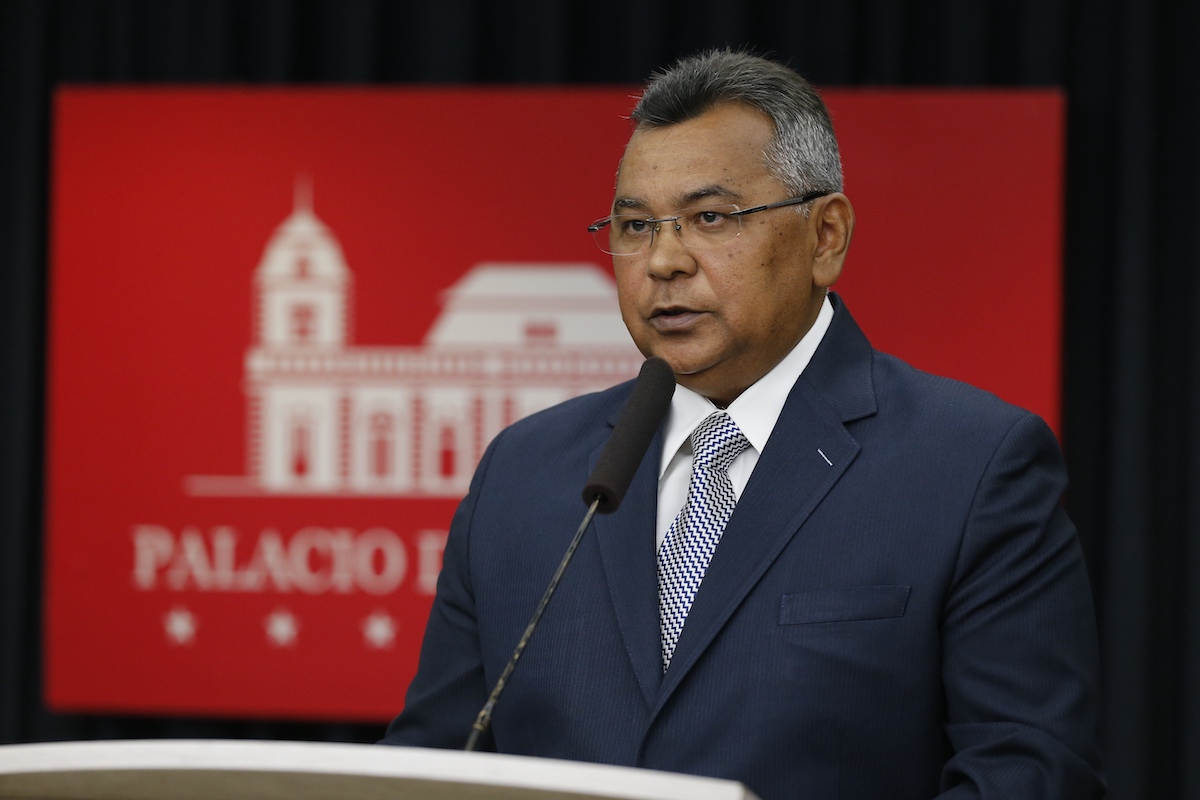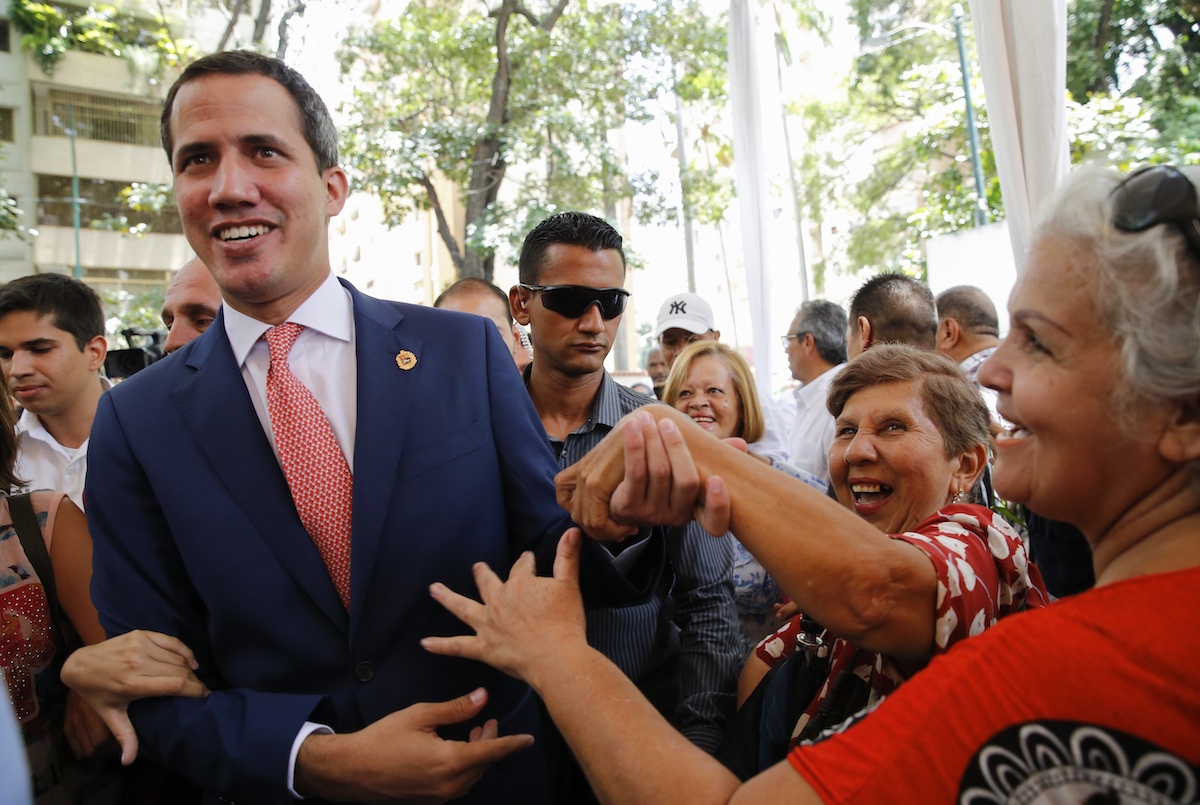

Venezuela’s Attorney General Tarek William Saab shows a foreign press article where they review the photograph where Juan Guaidó appears with Colombian paramilitaries and drug traffickers, during a prosecutor’s press conference, in Caracas, Venezuela, Friday September 13 of 2019. (AP Photo/Leonardo Fernández)
By CHRISTINE ARMARIO and SCOTT SMITH, Associated Press
CARACAS, Venezuela (AP) — Venezuelan opposition leader Juan Guaidó rejected allegations Friday that he has ties to an illegal armed group in Colombia, as officials launched an investigation based on photos appearing in social media purportedly showing him posing with members of the gang.
The pictures were allegedly taken in late February when Guaidó crossed into Colombia and made a surprise appearance at a concert organized by billionaire Richard Branson aimed at helping deliver humanitarian aid to Venezuela.
Government officials loyal to President Nicolás Maduro are holding up the photos as proof that Guaidó’s covert journey was orchestrated with the help of a Colombian criminal gang known as the Rastrojos, an accusation he denies.
“That day I took photos with many people,” Guaidó told Colombia’s BLU radio. “Evidently, it’s hard to know who is asking you for a photo.”
The spat over the pictures comes amid escalating tensions between Colombia and Venezuela as the presidents of both countries accuse one another of harboring illegal armed groups plotting across-the-border attacks.
On Wednesday, a dozen nations including the United States invoked the Inter-American Treaty of Reciprocal Assistance, which contends that a threat against any single signatory should be considered a danger to them all. The act raises the stakes of a potential military response though all sides have said they want a peaceful solution.
Venezuelan Interior Minister Nestor Reverol appeared on state television Friday laying out evidence for a new probe into Guaidó, displaying images at the center of the controversy.


Minister of Internal Affairs, Justice and Peace Nestor Reverol speaks during a press conference where he presented photos he said linked opposition leader and self-proclaimed President Juan Guaidó with Colombian paramilitaries, in Caracas, Venezuela, Friday September 13 of 2019. (AP Photo/Leonardo Fernandez)
“They prove yet again Guaidó’s association with all the terrorist actions being planned in Venezuela to disrupt the stability and peace of our democracy,” he said.
Gen. Luis Fernando Navarro, the commander of Colombia’s military, said two of the men seen in the photos with Guaidó are members of the Rastrojos who have now been captured. The photos show both men posing individually with Guaidó before a wooded background.
Navarro identified one of the men as Albeiro Lobo Quintero, alias Brother, and the other as Jhon Jairo Durán, alias Menor. Quintero allegedly turned himself into Colombian authorities sometime after the photograph was taken, while Durán was captured from a canoe after being injured in a fight with another criminal group in Venezuela.
Navarro said he couldn’t confirm exactly when or where the photos were taken.
Guaidó told BLU radio that he had no recollection of the photos being taken, and that he is pleased to know both men are no longer free.
“I celebrate that they’ve been detained,” Guaidó said.
The Rastrojos have been operating in the region for nearly two decades and at one point were considered a major drug trafficking group. However, their numbers are believed to have waned after the capture of several top leaders in 2012.
Tarek William Saab, Venezuela’s attorney general and a Maduro ally, rejected Guaidó’s claim that he had no idea who the men were. The new investigation is the fifth that Venezuelan officials have launched against Guaidó in recent months. He’s also being accused of sparking violent protests and orchestrating a nationwide blackout.
“It’s unimaginable to assume these were simply photographs taken by enamored fans who wanted a photo on the border with this guy,” Saab said. “Nobody believes this story.”
A video released back in February showed Guaidó crossing a small border bridge with a dozen aides dressed in collared work shirts. He jogged as he crossed, lifting up his hand and shouting encouraging words like, “We can do it!”
Guaidó was barred from leaving the nation at the time.


Venezuelan opposition leader Juan Guaidó is greeted by supporters as he arrives to an event in Caracas, Venezuela, Friday, Sept 13, 2019. (AP Photo/Ariana Cubillos)
Many Venezuelans use backroads known as “trochas” that crisscross along the 1,370-mile (2,200-kilometer) border with Colombia. Hundreds of such illegal crossings are controlled by criminal gangs.
Colombian President Iván Duque said Friday that officials had helped Guaidó in securing his safety as he entered the country though provided few details.
“We facilitated his entry to Colombian territory,” he said.
Relations between Colombia and Venezuela reached a low point earlier this year when Maduro broke off diplomatic relations after Duque backed Guaidó in a failed push to deliver international humanitarian aid across the border.
Tensions spiked again in late August when a former Colombian rebel peace negotiator and a small cadre of dissidents announced they were abandoning the country’s historic peace accord and taking up arms again. Duque has accused Maduro of sheltering the rebels and other leftist guerrillas who are still waging war with Colombia’s government.
Meanwhile, Venezuela’s government says Duque is allowing paramilitary camps in Colombia to train armed men and plot attacks against Maduro. Venezuela’s military launched two weeks of drills at the border with thousands of troops earlier this week.
***
Armario reported from Bogotá, Colombia.


